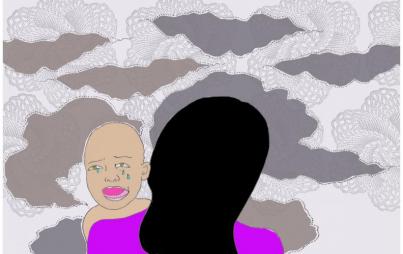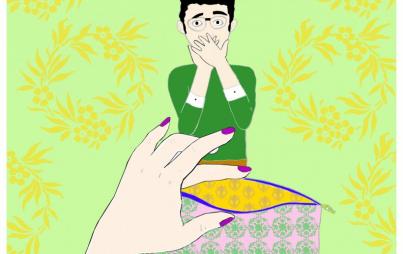
Like Water And Other Stories, photo courtesy of the author.
Ravishly is thrilled to present an excerpt from Olga Zilberbourg's LIKE WATER AND OTHER STORIES.
With settings that range from the Cuban Missile Crisis and Soviet-era Perestroika to present-day San Francisco, LIKE WATER AND OTHER STORIES, the first English-language collection from Leningrad-born author Olga Zilberbourg, looks at family and childrearing in ways both unsettling and tender, and characters who grapple with complicated legacies—of state, parentage, displacement, and identity. LIKE WATER is a unique portrayal of motherhood, of immigration and adaptation, and an inside account of life in the Soviet Union and its dissolution. Zilberbourg’s stories investigate how motherhood reshapes the sense of self—and in ways that are often bewildering—against an uncharted landscape of American culture.

Therapy. Or something.
I brought my mother to therapy with me today. Mother butted shoulders with me to march into the therapist’s office a step ahead. “I have to tell you right away, I don’t see why my daughter needs therapy,” she said, stopping in the middle of the room, halfway to the couch. “She’s a little anxious and disorganized, but who isn’t? Frankly, I don’t believe in therapy.”
My therapist, Dr. Lye, whom I’d selected because he promised to listen to me with acceptance, care, and respect, raised his eyebrows and explicitly turned to me, “Do you really think this will be helpful? Would you like a referral to a family therapist?”
“I don’t like that couch,” my mother pointed at the beige sofa where I was trying to make myself comfortable. “If you must have a couch, you should use natural materials. Wool. Cotton. How can anyone relax on this synthetic simulacrum? Has my daughter mentioned her dust allergy?”
She had not. Dr. Lye did not look amused. He sat in his usual chair, balancing a notepad on his knee, and rapped at it with his pen.
“Is there a particular reason your mother is joining us today?”
“I’m here to advocate for my daughter. I can say things about her that she’s too modest to say about herself. Speaking is not her strong suit. But what you must understand about my daughter is that she has a brilliant mind. Just imagine, she has all but finished her dissertation in number theory, a field vastly dominated by men. It’s too bad that she didn’t finish, but I understand there were reasons for that. Her advisor retired early and she lost her funding. She could do her research and teach without the dissertation if she wanted to. But currently she has chosen to focus on being a mom. She has two beautiful children. And when I say that, I mean, they are far more beautiful than the other children I’ve seen, including my own. And clever—the youngest, at age two, can already add and subtract and she speaks in full sentences. My daughter cooks their food and supervises their activities all day long. You know, she’s still nursing the youngest. She nursed her older son until the age of four. Can you imagine? No wonder her own health has been depleted. She’s literally giving them her all.”
“Why do you think your daughter needs an advocate?” Dr. Lye couldn’t help himself. Then, he turned to me. “Do you feel that you need an advocate?”
“This is what my mother is like all the time,” I said.
“She happens to be visiting this week, and I thought it would save us a bunch of time if you could just meet her.”
“I don’t understand why my daughter feels she needs to see a specialist of your ilk. All she needs is a little patience until the children are older. She could also lower her standards. I mean, would it be so bad if some of their food came from a box? She could at least let me buy them meals. That’s how I did it. There was no way I could raise two children and hold down a job if I didn’t accept help.”
My phone vibrated—the plumber. The pipes in our bathroom had burst that morning, and I’d had to phone one of those emergency services. I made a face, apologizing to Dr. Lye for the interruption, and took the call. My mother went on talking.
As I finalized arrangements with the dispatcher, I overheard my mother saying, “Since I am here, can you give me a prescription? I suffer from terrible migraines. Each time I close my eyes, my head starts throbbing and I feel like I’m dying. Why can’t my daughter just be happy? But she tells me she’s happy!”
Seeing that I had hung up the phone and was now listening, my mother changed the subject. “You should rearrange the whole room,” she told Dr. Lye. “This window doesn’t do you any good. That wall outside? Might as well be a funeral parlor, it’s so gloomy. Cover it up with a blind and place the couch in front of it. Buy a warm lamp—that’ll be cozy.”
The therapist turned to the window and opened it a crack. A draft instantly swept some papers from his desk to the floor. “That’s better,” he said, crouching to the floor to pick them up. “What would you like to talk about today?” he asked me.
Luckily, I didn’t have to say anything. My mother went on talking.








